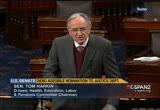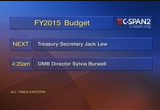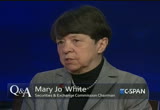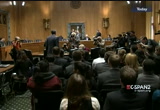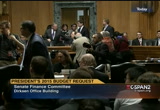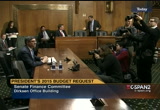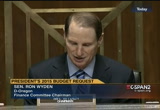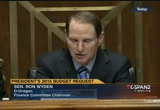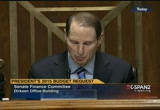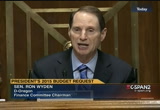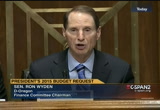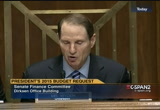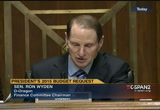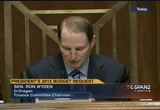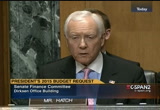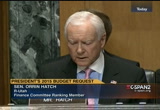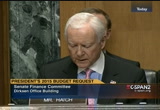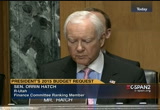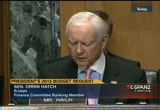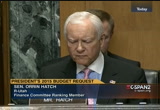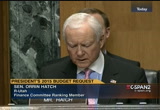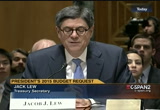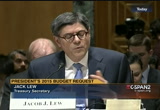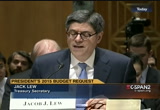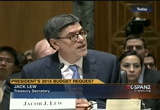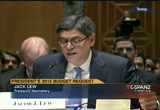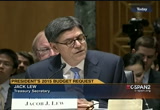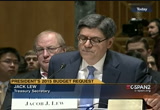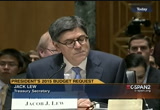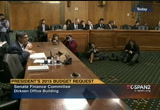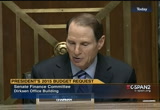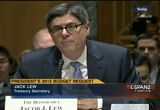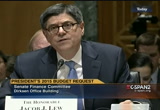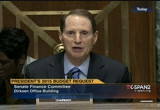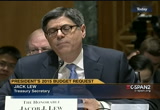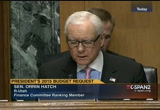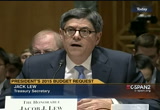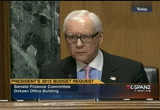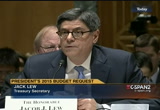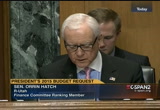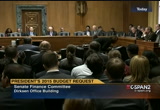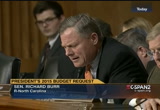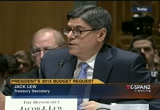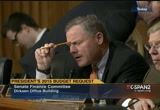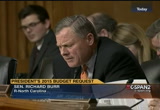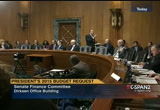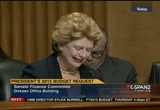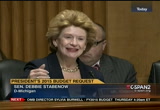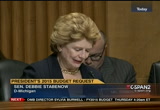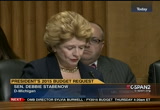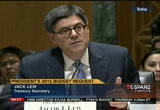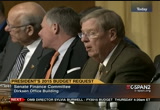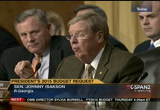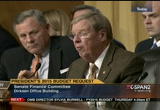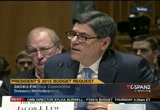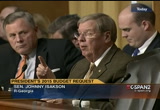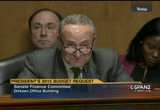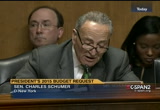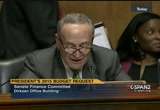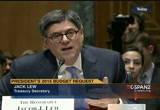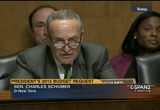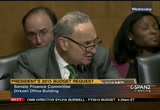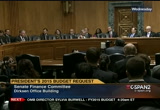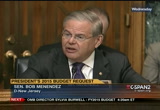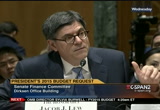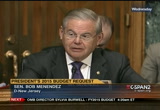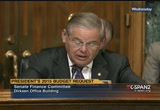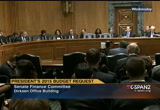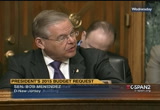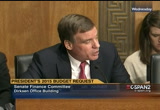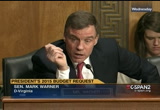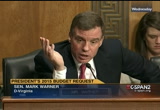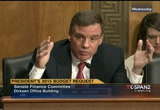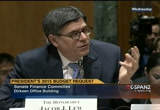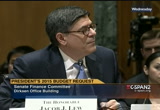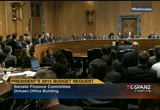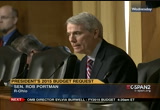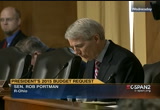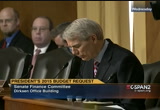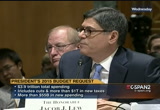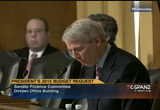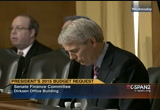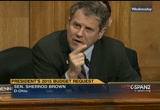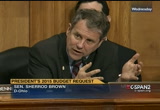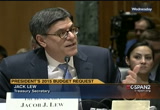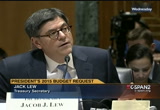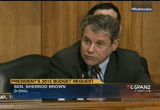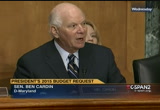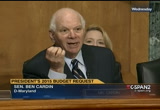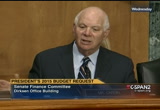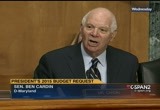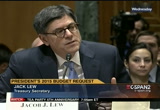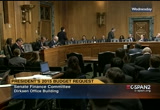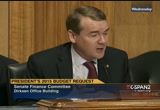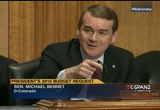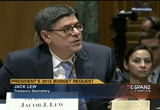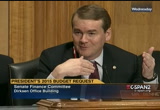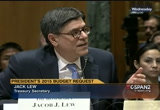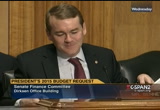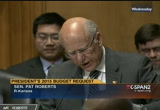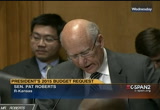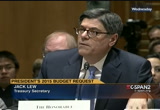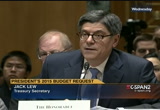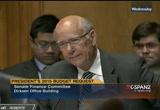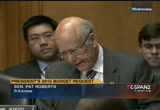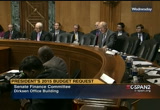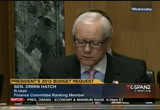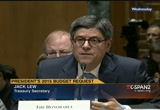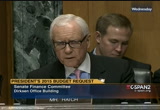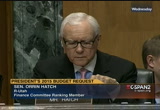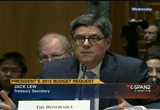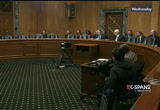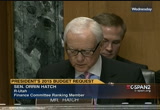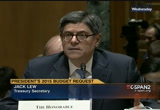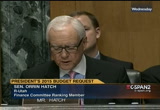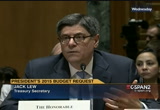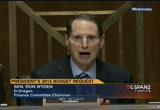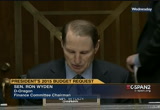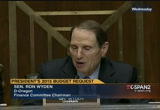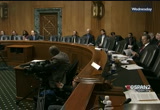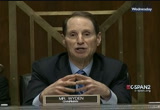tv Key Capitol Hill Hearings CSPAN March 6, 2014 2:00am-4:01am EST
2:00 am
2:05 am
good morning to all. and the committee will come to order. before we begin today, i want to assure everyone that you did not accidentally walk in to a meeting of the energy and natural resources committee, which i used to chair. our friend max bachus is off to do an outstanding job in china and this is still the senate committee on finance, with a storied history. now, in the storied department, i learned recently that senator hatch was an outstanding basketball player in high school. and i've learned through my sources that he had a great one-handed set shot. he's even in the baldwin high school hall of fame for basketball. now, i played a bit of
2:06 am
basketball myself, so, senator hatch and i may try to figure out a way to get a regular finance committee pickup game going, except we're going to probably try to see if we can find some arcane rules so that the young members don't make us look bad. i also want to welcome senator warner to the finance committee. senator warner demonstrates continually that our government can have a head and a heart. and we are lucky to have his business expertise, and bipartisanship on fiscal issues. i'm going to be -- [ inaudible ] the record will so show. i'm going to be brief this morning, and of course, state first that it's a tremendous honor to chair this committee, and to work with all of you. this committee is the go-to place for tackling america's big domestic challenges. and senator hatch and i intend to preserve the committee history of addressing these
2:07 am
vital issues in a bipartisan way. in addition, the finance committee is the principle committee in the senate with jurisdiction over international trade. therefore, we are now looking at every possible economic lever to pressure russia to step back from its unprovoked incursion into crimea. the fact is, russias aconsistently used trade as a cudgel to bully its neighbors. the committee members will want secretary lew to tell us how the administration can best marshal our country's economic might in defense of the people of the ukraine. now back on the domestic front, the committee has before it several issues with dates stamped on them. those issues include repealing and replacing the badly flawed medicare payment system for doctors, enacting bipartisan tax reforms that make the tax code
2:08 am
more fair, and more pro-growth, shoring up our transportation system and helping american workers compete in tough global markets. and we're very pleased to have the secretary here today to discuss the president's 2015 budget. this conversation with the budget is different than it's been in recent memory because this year the congress is actually operating under a bipartisan budget agreement. the government isn't closing down. so there's an opportunity to pivot from these budget battles and to focus on the big challenges before the country. i would submit that the top challenge is sustaining and expanding our middle class. today america has what i call a dollar tree/neiman marcus economy. as has been noted in several publications the bargain stores are doing well and the high end retailers can't keep enough of the expensive items in stock. but stores that cater to the middle class are hurting.
2:09 am
every one of our big economic challenges depends on sustaining and growing the middle class. and just briefly i'll tick off a few areas where we can boost that cost. the first is innovation. whether it's the tax code or other action, investment in innovation and research can help turn creative start-ups into thriving businesses with more good paying, high skilled jobs. that's why i plan to move quickly to extend a number of expired tax provisions, such as the research and development credit. over the long term that credit, through comprehensive tax reform, could be made even more useful for american start-ups. the obama administration's budget includes a proposal for business tax reform. i believe a broader approach which comprehensively overhauls our broken dysfunctional code would do more to give all americans, especially middle class, the opportunity to get ahead. we're going to work in a bipartisan way with the administration closely on that
2:10 am
matter. a second priority ought to be savings. the vast majority of savings are delivered through the tax system. and it's time for fresh policies that give all americans the opportunity to accumulate wealth. the president offered one proposal to help workers save during the state of the union and the budget includes another called auto i.r.a.s. there is an additional idea that ought to be examined. as has been noted previously, establishing a savings account for american -- for every american child has had deep conservative roots and significant bipartisan support. the idea of helping young people, particularly ones of modest income, be part of the opportunity to accumulate wealth in this country is especially important, and such accounts could hope doors to higher education, home ownership and retirement security. third the committee is going to focus on education. this is another area of where
2:11 am
the tax code doesn't pass the smell test. there are 15 separate incentives to help defray the cost of an education, and each has its own set of mind-numbing rules and definitions. there are ways to improve those incentives, not just in the short-term, but for the long haul through real tax reform so that more americans can secure the economic mobility that an affordable high-quality education can give. fourth, you can't have big league economic growth with little league infrastructure. the committee is now working to provide fresh thinking that can pull some of the billions of dollars of private sector capital off the sidelines, and into infrastructure investments that park new job growth. and america will soon need a solution to keep the highway trust fund solvent. we are going to go prospecting colleagues for bipartisan ideas in both areas. in closing, this committee is going to focus on other issues outside our borders, besides ukraine. one aspect of the international
2:12 am
trade agenda that a number of colleagues have spoken about is currency manipulation. it's a major challenge confronting american workers and manufacturers. i look forward working with secretary lew and the department to ensure that our country is doing all it can to address misaligned currencies. and finally, i ask secretary lew to depart just for a moment from your portfolio. i'd like to publicly than the president for adopting a plan that centers crepo and bennett and i from the finance committee and senator rich and udall for federal wildlife policy. fires throughout oregon and throughout the west have gotten bigger and hotter but our policies have not kept up. and this new system is going to allow us to get more value out of this, in my view, also, helping in a bipartisan way to address the challenge of these natural disasters. let me turn now to senator hatch for his comments. and also, again, express our
2:13 am
thanks to secretary lew for his appearance. senator hatch. >> well, thank you mr. chairman. and secretary, we're very happy to have you here. i want to welcome our distinguished friend from virginia, senator warner, to the committee. we're very pleased to have you on the committee. with your business background i think it would be a great deal of help to all of us on this committee. but before i begin my statement, mr. chairman, i'd like to take this opportunity to welcome you as the new chairman of our committee. already you've hit the ground running, and you're, i think, setting a very good example for all of us. and i've really enjoyed the time that we spent together up till now, and i look forward to a long-term working relationship with you. and hopefully we can -- we can do even better for this committee as the future occurs. and for those who don't know, senator wyden always plans ahead, and thinks about future opportunities and challenges. for example, almost a decade ago senator wyden selected the
2:14 am
senate office closest to our committee offices. if you look down the hall you'll see the oregon state flag. it's unique among our nation's state flags in that the front and back parts are different from one another. on the front is the state seal, and on the back there is a depiction of a beaver. as this flag demonstrates is typical of oregonians to think outside the box, senator wyden is no exception. i'm quite certain that he will bring his unique talents to the big job of chairing this great committee. mr. chairman, i look forward to working with you in this new capacity. right out of the gate i want to thank you for holding today's hearing. and it's very, very important to have secretary lew here and to have this hearing on president obama's fiscal year 2015 budget proposals. and again, thank you secretary lew for appearing before us today. to begin, i'd like to note some problems with the process by
2:15 am
which this proposed budget has been unveiled. first of all, we received this budget just yesterday. a full month past the statutory deadline. and what budget information we did receive yesterday is incomplete. for example, when you look at the appendix of the budget there is often reference to a section called, quote, analytical perspectives, unquote. but those perspectives are nowhere to be found. i assume that the rest of the budget information is forthcoming. still, we can only wonder why it is being released a few pieces at a time. the administration appears to be approaching this hearing in the same way as we did not receive senator lew's written testimony until late last night, which was less than helpful. when we get past the process issues and into the substance of the president's budget, we see that the administration appears to be short on new ideas. indeed, this budget consists largely of proposals from president obama's past budgets, which is surprising given that
2:16 am
none of them have received a single affirmative vote in congress. these proposals represent a continuation of three familiar themes. first, we see the administration's continued insistence that we can achieve prosperity by adopting more tax and spend policies that grow the federal government. second, there are the proposals centered on the apparent belief that ever more income redistribution will somehow lead to economic growth and job creation. and finally, we see another attempt to define, quote, tax reform, unquote, as a process of raising taxes in order to fuel more federal spending while closing whatever the administration deems to be a, quote, loophole, unquote, in the tax code. based in part on rosy economic assumptions the administration believes that its proposals will reduce our high debt-to-gdp ratio. but to get there, and to help full ill fitz tax and spend objectives, the budget envisions
2:17 am
well over $1 trillion of additional taxes in the face of a persistently sluggish economy. i think that bears repeating. president obama's latest budget contains more than a trillion dollars in proposed tax hikes. the administration claims that it has for years now, that these additional revenues are needed to restore fiscal responsibility andry deuce the deficit as part of a, quote/unquote, balanced approach. however, we need to look at the facts. let's consider the deficit reduction that has occurred since the high deficit watermark achieved in fiscal year 2009. from the deficit of over $1.4 trillion in that year, the deficit fell to a still high $680 billion in fiscal year 2013. of the $736 billion of deficit reduction, $670 billion came from increased revenue and only
2:18 am
$66 billion came from reduced outlays. so in terms of budget realizations, rather than promises for the future, less than 9% of the deficit reduction between 2009 and 2013 came from reductions in spending. the vast majority came from increased revenue. yet remarkably in the face of that history, the administration's insatiable desire for higher taxes leads it to propose more tax hikes along with even more spending. put simply, the tax hikes envisioned in the president's budget are not what our struggling economy needs. unfortunately, while having pledged to focus like a laser on jobs, this administration decided over the past five years to focus on expanding government, with a failed stimulus. the affordable care act. and initiatives like the dodd-frank act that is growing the big banks, and shrinking community banks. none of these efforts lay the
2:19 am
foundation for economic growth. and sadly the budget offer this week does not present a vision for such growth in the future. instead, this budget proposal appears to be a political document designed to shore up support from the president's left-leaning base in an election year. now this needless to say is disappointing, given all of the real challenges our nation continues to face. and as you can see, mr. chairman, we have a lot to discuss today when it comes to the proposals in this budget, and there are other issues at the treasury that also warrant our attention today. for example i find it incredible that even with all the challenges our nation is facing, the treasury department has decided to place the singling out of 0015 c four organizations for scrutiny near the top of its administrative agenda. as with the budget it appears that the policies are driving the decision making when it comes to promulgating
2:20 am
regulations through treasury. the politics are actually driving this. in my view, it would be useful for the administration to focus more on growth in the economy and jobs than on how the president's party will fare in the next election. with those concerns in mind, i look forward to today's hearings and i want to thank you, mr. chairman, and welcome, again, as our leader on this committee. >> thank you, senator hatch. and particularly your focus on the bipartisanship that we've been talking about is especially helpful. secretary l.e. secretary lew we're glad to have you. we'll put your prepared remarks into the record and please proceed, as you wish. >> thank you very much, chairman wyden, ranking member hatch, members of the committee. i thank you for this opportunity to appear before you today to testify on the president's budget. i want to add my personal congratulations to chairman wyden as we begin his first hearing as chairman of the finance committee. we've worked together for so many decades, it's a real honor to be the first witness. >> it was when i had a full head
2:21 am
of hair and rugged good looks. >> and it's also a pleasure to welcome senator warner here as the committee's newest member. beforecommittee's newest member. before i begin, let me say a few words about the situation in ukraine. as president obama has explained in no uncertain terms, the steps russia has taken to violate international security is a breach of law. we're looking at sanctions and increase increasing the isolation. as ukrainian government prepares for elections in may. it's critical the international committee support their efforts to restore economic stability. i've spoken with the ukrainian prime minister several times and told me his government is ready to adopt vital economic reforms. we've been working with congress and partners with a government
2:22 am
assistance package to help the ukrainian government return to economic stability and return to economic growth. as part of this international effort the united states has developed a package of bilateral assistance focused on meeting ukraine's most pressing needs including a $1 million loan and supporting the capacity to lend additional resources to ukraine and continued u.s. leadership at a critical time. while the united states will not increase our total financial commitment to inf for the reforms. for every dollar the united states contributes to the imf, other countries contribute four dollars more. at a time when there are nextal calls to play a first responder role in ukraine it's imperative to secure passage of imf legislation now so we can to the support to the imf in this
2:23 am
critical moment and be a critical voice in this institution. i want to be clear even as we deal with unfolding results in ukraine it's important to expand opportunities for all americans. over the past five years we've accomplished a number of things to make our country stronger and better positioned for the future. since 2009, the economy has steadily expanded. our businesses added 8.5 million jobs over the last 47 months, the housing market has improved and rising housing prices are pulling millions of homeowners from under water. at the same time, household and business balance sheets continue to he'll, exports grown and manufacturing making solid gains. the truth is as the president said in the state of the union we are mandatory ready to meet demands of the 20th century than any other country on earth. our country was thrown against the back the hardest in our
2:24 am
lifetime. the question is what are we going to do about it? the president's budget makes a pledge to make this a year of action and offers a framework for long term prosperity and competitiveness. this budget faces critical needs of this nation. corporate profits hitting all time highs, middle class wages have hit a plateau and long term ongoing unemployment a challenge. recognizing while the stock market is vibrant, saving for college and paying for it is little more than a dream for families. while security threats are shifting and we're bringing the war in afghanistan to a responsible end, soldiers and military families and veterans struggle to succeed in our economy. it recognizes while work is being done to put the final pieces of financial reform in place, reforms like the volcker rule made our system stronger and an engine for economic growth once again.
2:25 am
the solutions stems from a frank assessment of these challenges and designed to show how to make economic opportunities and bolser the middle class. for instance, a cornerstone of this proposal is extend the unearned in income come credit to reach workers. it's time to adjust it so it does an even better job of rewarding hard work. this tax cut that would go to more than 13 million americans would be fully offset of tax loopholes that let high income professionals avoid income taxes other workers pay. another initiative that makes a different for hard working men and women the ira. it will be available this year and allow americans to have a nest egg that's safe, simple and can never go down in value. while this budget puts forward pro growth initiatives it has pro growth strategies by passing comprehensive immigration reform
2:26 am
and trade authority. make no mistake. this budget is made to build on success we have made together and fiscal responsibility. the gdp has fallen more than half since the president took office marking the most rapid decline of deficit since the period of demobilization following the end of world war ii. the deficit is projected to narrow even more this year and today we're chart ag course to push it below gdp by 2024 and reign in the national debt relative to the size of the economy over ten years. last year, the president put forward his last offertory speaker boehner in his budget as part of a balance compromise. this year's budget presents the president's vision of the best path forward. while the president stands by his last offer he believes the measures in his budget are the best way to strengthen our economy now. as this budget demonstrates, the president is firmly committed to making tough choices to tackle our fiscal challenges and our
2:27 am
fair and balances solutions represent a comprehensive approach to strengthening our nation's financial footing. this approach shrinks the deficit and debt making detailed changes to medicare and eliminates wasteful corporate tax loopholes and subsidies that don't help our economy. increasing fairness in our tax code is not just about improving our nation's fiscal health. it's about generating rooms to make investments that will strengthen the foundation of our economy for years to come. that means creating more jobs, repairing our infrastructure and fostering 2k34ik energy production. it means training americans to get jobs by promoting apprent e apprenticeship and upgrading worker training programs. improving worker system by improve i improving high schools. and increasing college affordability and raising the minimum wage to $10.10 an hour
2:28 am
and indexing it to inflation. in closing let me point out this budget represents a powerful jobs growth and opportunity plan. it is carefully designed to make our economy stronger while keeping our fiscal house in order. what's more it offers washington a real chance to work together. as everyone on this committee knows for too long brinksmanship in washington has been a drag on economic growth. we've seen a significant amount of bipartisan progress in recent months and that helped improve economic momentum. some say it's fleeting and some call it election year posturing. ir don't agree. i believe this progress is real and believe we can find common ground to make a difference and believe we can get serious and get things done for the american people by working together. thank you very much and i look forward to answering your questions. >> secretary lew, thank you and we, too, look forward to working with you. let's begin with ukraine, if we might. it appears to me vladimir
2:29 am
putin's actions in ukraine represent a last gasp for gr grandeur and will only isolate the footprint of the country he calls home. yesterday they launched an in r inter-continental missile. when was the last time a russian company launched a new automobile line or internet company that could compete on the world stage. to me, his efforts to demonstrate power through 20th century imagery only demonstrates the weakness russia is showing under mr. putin's leadership. senator hatch and i have zeroed in on a number of areas particularly in the trade domain we think we can promote sensible policies to hold mr. putin accountedable, such as insuring russia's world trade agreements are fully enforce. they aren't now.
2:30 am
we canas tried fools. what i thought i'd ask, what do you think your best economic levers are at this point? give us, if you might, your sense of how we might have some guidelines to evaluate all the proposals. i think senator hatch might have count of all the proposals to deal with russia. if you might start there, what do you think the best economic levers are an guidelines and working with allies? what do you think the guidelines are we might use? >> mr. chairman, i think the president's been clear and we have been clear russia has to be held accountable for the actions it's taken and a path to step back from what is a dangerous
2:31 am
escalation unless it stops. the president has announced to illustrate serious attempts and i think effective ways to start this process of increasing russia's isolation. the g8 is a very important meeting to russia. we have already withdrawn from participation and preparations for it and we're on a path where i think it's clear russia cannot sit at a g8 meeting while pursuing the policies it's now pursuing. we've withdrawn a trade mission supposed to be working with russia to continue making progress by international investment treaty. we've withdrawn a presidential delegation supposed to be attending the paralimi parp ola something we support but not a time go to russia. the president made it clear if
2:32 am
asked to develop further options we will continue to address further options and will reserve for the president to address future steps we might take. it's clear there need to be steps to hold russia accountable for actions taken to date. what we have to do has to be responsible and proportional as we go forward. >> if you could, mr. secretary, because of the urgency of the situation, let's say within 48 hours, if you could particularly give us some measures or guidelines in terms of how we would evaluate the proposals and you could get that to senator hatch, that would be helpful. senator hatch and i. the question i wanted to ask with respect to the economic challenges, i think we all know while the economy is improved in a number of areas, we still have an enormous challenge dealing with the long term unemployed. we've got lots of folks out of work who result of technological changes, a whole host of factors
2:33 am
have been unemployed for a long long time. how does the president's budget, in your view, best address the needs of the long term unemployed? >> mr. chairman, i think in a sense, the entire budget is an answer to that question. it's not just one thing that we've done. it's really the frame. we need to drive economic growth because the engine for creating jobs in this economy is economic growth. in its entirety, that's what this budget is designed to do. specifically, we have targeted areas, where from extending unemployment benefits to te long term unemployed to skills training to establishi ining manufacturing hubs, extending buy america bonds we're now calling america fast forward bonds, to continue expanding infrastructure spending, one of the things you were one of the champions of, these are the kinds of things we need to do. it's clear if you look at policy thrusts of building infrastructure and skills training and by skills training
2:34 am
important to start at early childhood and go all the way to re-training when someone loses their job. those are the things we need to do to have a vibrant economy in the future and this budget lays forward how to do that. >> thanks, colleagues, if we are going to stick to the five minute rule, i better set an example. my time is done. senator hatch. >> thank you, mr. chairman. mr. lew, appreciate you being here today and appreciate what a difficult job you have. the nonpartisan congressional budget office says over the next ten years, spending on social security, medicare, medicaid, c.h.i.p., and exchange subsidies will total over 21.6 trillion dollars. moreover that spending will grow at an average rate of 4.4 appearance compared to the gross in the size of the economy projected to be 8.2 appearance and means growth is unsustainable. mr. certificatesecretary, i hav
2:35 am
questions of entitlement i just mentioned. in light of the cbo projection of 21$21.6 trillion of spendingn entitlements, that's just some of the entitlements, by how much does the president's budget propose to reduce such spending and second, does the budget propose to reduce growth in entitlement spending at all and if so how? >> i think the observation you're referring to is one we've seen for a long time, has to do with demographic aging of the baby boom, the fact people my age and older are retiring. we knew there was going to be an increase in spending on entitlement programs. the question was would our fiscal house be in towards dealing with that. this budget shows for the 10 year period we reduced the budget percentage of gdp to less than 2 percent. we're on a staff of solid
2:36 am
foundation. we have $400 billion of specified savings in medicare and obviously these are challenges that we've all known were coming for decades. i think that the -- keeping other fiscal house in order is of critical importance. how we do that reflects how we build an economy that's growing. growth has a lot to do with our ability to tackle the demographic challenge. unless we can get growth, sustained growth into a healthy place, those fiscal challenges will only be more complicated. thick this budget is a blueprint that deals in the right way with the next 10 years of laying a foundation for the future. >> okay. >> last year, the social security trustees, which include you, reported that the social security disability insurance trust fund will be exhausted in 2016. as a trustee, secretary lew, you
2:37 am
urged lawmakers act in a timely way to quote phase in necessary changes and give workers and beneficiaries time to adjust to them unquote. mr. secretary, in the face of the impending exhaustion of the disability insurance trust fund, what does the budget propose if anything to address the exhaustion of that fund or address the impending exhaustion of the social security entitlement trust fund a bit further down the road. >> senator hatch, obviously the time frame for the disability trust fund is much more immediate, 2016 versus decades away. i think when experts look at what the options are for the disability trust fund in the short term, there's a general agreement there's going to need to be some kind of reallocation of premiums that go into the trust funds for the short term. in the longer term our program lays out a way to insure people who apply for disability are
2:38 am
qualified for it and make the kind of changes to protect that critically important program and make sure it's sound on the long term and we look forward to working together on a bipartisan basis on that. >> page 33 of the budget document discusses the future unsustainable deficits and debt and alludes to a larger tax increase that is undefined in the document. specifically the budget identifies even with reforms to medicare and entitlements and tough choices on the discretionary side we need additional revenue to maintain our commitment to seniors unquote. i have two questions for you which i will read through, and then you can respond. first, if you agree that the part of the budget then in addition to tax increases in the budget, what tax increase, either in terms of dollars over the next 20 or so or as a share of gdp does the administration believe will be necessary to get
2:39 am
what it identifies as needed additional revenue to maintain our commitments to seniors? and, second, do you think that the entitlements will have to be financed at least in part to a value-added tax or carbon tax or some other non-income based tax added to our existing tax system >> senator hatch, i think the budget lays out clearly our tax policies for the next 10 years. for a number of years now the president has laid out principles that should govern how we look at social security reform, and i'd be happy to follow up and work with you on that going forward. >> i would appreciate that. my time is up. >> senator burr up next and then senator stab beno. >> both you and the president stated you were outraged by this
2:40 am
behavior. senator, do you stand by that comment today zblrnlts >> senator, i have stood by my comments the actions taken reflected bad judgment and were unacceptable, couldn't happen again. we put in place an acting director at the irs who did a fine job to bring things into order. we have a new commissioner at the irs equally first rate. we are committed to running the best irs we can possibly run. i'm equally cobbconvinced there was not any malicious action there, it was bad judgment and that bad judgment was unacceptable. >> i ask you because the contrition you express seems at odds with the current attitude. both you and the president have gone so far as to address the irs persecution as those that disagree with you as a phony scandal, to be quoted. i'd suggest you're even going further than that in attempting to codify that bad behavior into
2:41 am
law. how can we interpreter this new rule as anything other than an attempt to achieve the same stifling of 501(c)(4)s lois lerner was in fact doing? >> senator, i continue to believe that the attempts to turn this into a scandal do not reflect the nature of the bad judgment involved. >> mr. secretary, 100 appearance of the 501(c)(4)s that had tea party in their name were referred for extra scrutiny. progressive the word 0 progressive did not appear on the bolo for extra scrutiny. of 298 political cases only 6 had progressive in their name. what do you conclude from that? >> senator, i think bad judgment was equal opportunity. it addressed concerns of the right and the left. it was not good judgment and
2:42 am
unacceptable. it was not politically motivated. >> 298-6. >> you asked about the regulations. i want to point out about the proposed changes and regulations. after the situation was evaluated by the inspector general and treasury, there was a report that laid out actions to be taken. i made a commitment to keep all those recommendation, follow through on all those recommendations. one of them was to clarify the rules where the confusion in the policy was what was at the root of the bad judgment that caused the problem. in the proposed rule we put out, it was actually a request for broad comment. >> you've got 100 -- >> didn't provide as detailed a policy as many people have said. we've gotten over 150,000 comments. we're going through that, as we said we would. >> did you have any conversations, prior to the 10th of last may, when lois lerner made her revelations concerning issuing a new rule restricting
2:43 am
the political activities of tax-exempt groups? >> well, the ig report that came out -- i don't remember the date of the ig report was right after that we said we would follow through on all the recommendations of the ig report. i'd have to check the date. >> mr. secretary, last june, i sent a letter to the irs encouraging them to respect the controlling earthquakesomb guid respect performance awards to irs employees. as a former director of omb, i know you must feel following omb's guidance is important. that's why i'm sure you share my concern that the new commission commissioners decided to reverse that decision and pay out a portion of the bonuses. given that call lammy us to behavior of the tax-exempt division and i think the damage it's done to the public trust and the agency's ability to perform its core functions, do you believe it was appropriate for those employees to receive a bonus? >> senator, i have to start by saying the overwhelm iing vast
2:44 am
majority of employees at irs are hard working employees who do a fine job and deserve respect and thanks and that is important for all of us to remember. secondly, there was a suspension of the -- of the -- the bonus policy during the sequestration period. there was a challenge under some of the collective bargaining agreements. i defer to the commissioner of irs how he worked out the policy subsequent to that. >> did you pay bonuses last year at treasury? >> i don't believe so. i -- i'd have to double-check. >> do you intend to pay them this year? >> i'm not sure that decision's come to me yet. >> thank you, mr. secretary. thank you, mr. chairman. >> thank you, senator burr. senator stabenow. >> thank you, mr. chairman. first, i want to welcome you to that position and look forward to the basketball games.
2:45 am
mr. secretary, welcome as always and to the senator from virginia, we're happy to have you, down at the end of the table. we appreciate you being on the committee. a couple of things, in addition to my questions, i want to say given everything that happened at the irs, i want to say you finally have the president's person since the irs, just for the record, was operating under president bush's irs commissioner through all of this and realizing there are legitimate questions and we all certainly want things to go well, i'm glad in the last couple of months we've finally been able to confirm the president's team and i'm confident going forward this will be addressed in a fairway. i just want for the record to say which we were operating. secondly, we're always going to have this debate about how to move the economy. just for the record also,
2:46 am
legitimate differences, but i'm for whatever works. i'm sure you would agree. came in under president clinton in 1997, into the house. we balanced the budget within six months. i took full responsibility for that, mr. chairman. what was interesting was what worked was asking those doing very very well in our country, wealthiest americans to contribute a little bit more to help balance the budget, making strategic cuts on things that didn't work and making strategic investments in education innovation. we balanced the budget. then we tried a different approach next with the bush administration that reflected high deficit spending on wars, we could debate the wars but they weren't paid for. at the same time, rather than paying for them, tax cuts, revenue los to those that were the wealthiest americans.
2:47 am
then, unfortunately, ending up in cutting investments to middle class family, opportunities for education, so on, deregulation, went forward on wall street, lost 8 million jobs. now, we come to the obama administration again back to trying to balance this. i think it's pretty significant we have seen the deficit more than cut in half and you're saying we're on a path to create 2 percent of gdp in terms of the deficit, jobs come back not as fast as we'd like them to, but coming back and we're trying to rebalance by focusing on education innovation, those things that will grow the middle class because we know we'll never get out of debt with 10 million people out of work. just for the record, i feel like, mr. chairman, we have approaches that have worked and approaches that haven't worked. i think we ought to focus on what works. my question, mr. secretary, as chair of the agricultural
2:48 am
committee overseeing the accumulates future trading commission, this is an agency, as you know, that is incredibly important, as we strengthen our economy and create opportunities for investments and overseeing markets that impact cost of groceries and fuel and interest for mortgages and interest rate and so on. when we look at the cftc's increased responsibilities the last couple of years and budget they barely have more staff than they did 20 years ago. as you know, their oversight has grown tremendously. futures markets grown five fold, roughly 10 times the size of the futures markets, new responsibilities. they bring in $2 billion in fines last year alone but receive only about $215 million to operate. i'm very concerned about the ability for this agency to be
2:49 am
effective in supporting our economy. i wondered if you might just speak to the proposals by the administration and how this cftc fund i funding matches up with other funding mechanisms for other regulators. >> thank you, senator stabenow. i must say thank you for the comments about the 1990s. i had the opportunity of being a budget director during the years we ran a surplus and couldn't agree with you more that we had a set of policies that work and today have a set of policies that work and we know how to do this. as far as cftc goes, it has been a major issue since dodd-frank was enacted we need to have enough people to implement the rules and have cops on the beat to enforce them. we got just enough money in the appropriati appropriations bill this time to start ramping up to the point we need to to implement the rules. we need a sustained level of
2:50 am
funding, predictable with the increases to reflect the extra work that is required to implement the new rules. we have suggested it would be a good idea to explore the kind of self-funding mechanism the bank regulator have so our financial regulators don't have to worry about year after year ups and downs and funding and make sure their fundi ienforcement progra there every year to protect consumers. >> thank you, mr. chairman. >> if senator schumer is willing, senator isaacson could go and then senator schumer. >> thank you very much. thank the senator from new york. mr. chairman, welcome, congratulations on your chairmanship. after my work with you the last nine years on the senate i'm sure will be an enlightened time and look forward to working with you. i call you to the top of page 3.
2:51 am
the president called for streamlining and accelerating the permitting process for infrastructure initiatives and budget includes permitting improvement center to help with these efforts. is that correct? end quote. >> i don't have the pagination in front of me but that is our policy, yes. >> i'll share with you. >> i trust it's correct. >> this is a little bit of parochial question certainly my own self-interest and that of senator chambliss. it belies everything your statement says. you may not know it and appreciate you following up on it. for 15 years neport of savannah has been authorized for expansion. we've gone through 15 years of environmental studies, noaa requirements, oxygenation requirements. the state has raised 2$248 million to match federal money to expand that port. i traveled with vice president biden to panama, the mayor of philadelphia and baltimore just recently because of the vice president's intent to expand
2:52 am
infrastructure projects for the same reasons you state in your statement. on the 28th of february, just a few days ago, after everything had been done, 902 waivers in both the house and senate for the bill, the president and vice president -- i don't want to quote the president, i can't quote the president. the vice president said i quote we will get this project in savannah done come hell or high water. everybody in the corps was prepared to sign the programm g partnership agreement. noaa signed off, epa signed off. money was in the bank at the state, everything was done. the director of omb called the corps of engineers and told them specifically not to sign the partnership agreement. two weeks before we passed the omnibus appropriations act i was one of the nine republicans who voted for it we met with the director of omb and the director sent personnel from her off physician to meet with staff of mine and staff of senator chambliss to craft the language for the appropriations bill to
2:53 am
ensure she would have the authority, the right wording an right authority to move money in the budget for fy 2015 from intended to construction. all of a sudden friday of last week the phone started ringing, direction went to the corps of engineers, do foot sign the partnership agreement. i personally got calls from omb saying there's no precedent to do what we're doing just three or four weeks after we met with staff to craft the language they put in the appropriations bill. i can't understand how the administration can say it wants to accelerate projects when we get a last minute hold on a 15 year authorization every i has been dotted and t has been crossed. do you have an answer for that? >> senator, as treasury secretary i'm not deeply in te s individual project considerations, i can't address that port of savannah. >> i already talked to the omb director and ask you to look into it personally
2:54 am
>> i will take the question back but not a department of treasury issue and would go to omb with the question. going back, we have made a lot of progress streamlining the approval process for important projects. in my home state of new york and senator schumer's home state of new york, the bridge permitted in 18 month nobody believed is possible. this is something very important and something we're committed to and i will take back your question. >> i appreciate it very much. mr. chairman, can ask you a question? >> of course. am correct both the majority and minority side are still investigating the situation on miss lerner is that correct? >> we are working on the investigation that began under chairman baucus and continue to work on it and do it in a thoroughly bipartisan way. >> the reason i mex thntion thar your edification and benefit i have taken every friday to do town halls in georgia. the number one thing i'm asked about is for irs to do audits.
2:55 am
it cannot be dismissed as an error in judgment until we get all the facts and find out if that's in fact what it was. i would encourage you at treasury being responsible for irs to let them know they're the number one topic of conversation and when april 15th comes they'll be the number one topic for a lot of reasons we all are familiar with. it is the public's number one concern >> we tried to be cooperative and will try to be cooperative with this committee and the house committee's investigation and irs commissioner has made a similar commitment. we understand you need to complete your investigations. i can just offer our judgment based on what we know. >> thank you, mr. secretary and chairman. >> senator schumer. >> thank you, secretary lew and for the wonderful job you're doing. very glad you're there. i'm glad as a new yorker but more importantly as an american. i want to applaud your
2:56 am
commitment on this budget to focus on the middle class like a laser. the deficit is a problem, no question about it. we've made good progress on the deficit. i would posit the number one problem facing america is the decline of middle class incomes. it affects our economy in so many ways. it affects our politics. it affects our whole way of being as americans. doing the kinds of things you have done in the budget, both in terms of tax, such as the earned american opportunity tax credit, the provision that i helped author and worked with you to extend, making it permanent is great. the child tax credit and on the spending side i know is not your department, but doing investments and infrastructure and education and research. those are the ways to get the middle class moving again and have my highest priority. i have a couple of questions here on specifics. the first is on the as pire act.
2:57 am
i know the chairman mentioned it in his opening remarks. it's so important because one of the greatest block is savings and assets to many americans. 19 appearance of new york households and 31 appearance of households nationwide have no savings account. that's sort of unheard of. that's what's happening. i remember when i was in grade school we put a quarter into the king's highway savings account every week and got a bankbook and it showed -- >> the ridgewood savings bank. >> there you go, another fine new york institution. that's not done anymore and children from families face significant barriers attending college and owning a home. for several congresses i've introduced congressman gingrich was a sponsor, senator santorum. it has real bipartisan support, the aspire act that would establish a universal child savings account with federal
2:58 am
seed money and matching contributions. i first am appreciative of the chairman highlighting this issue as one of the issues he wants to move this year i really appreciate. he mentioned it in his opening remarks. but i hope we can count on your support and the administration's support for technical guidance as we move forward and support of the basic concept create ag lifetime savings fund for every child wen issued a social security number, teaching people to save, encouraging people to save, one of the great problems in america is we don't save enough the way we used to. would you please comment? >> senator schumer. we totally agree encourage iing savings is a critically important objective. that's one of the reasons we have made the proposal such a prominent feature. it doesn't sound like that. starting a an account for $25 and add iing it every pay perio
2:59 am
is the same thing you're talking about. the aspire account is something we're happy to talk to you about and work with you >> that's at the other end, young people opposed to golden agers. >> we're happy to work with you on the proposal. obviously, it's a question of, in limited -- with limited resources, how do we optimize the decisions we make and we're happy to work with you on this. >> great. well, thank you, and i look forward to -- i'm going to bother you until you end up supporting it. it's now or later, take your pick. okay. next issue is the aotc. i was glad to see you made it permanent. one of the great problems the middle class faces is paying for college. it's become so much more expensive. somebody, at one of the little forums we had, said when he went to college, paying for -- if he worked 40 hours a week on the minimum wage they could earn tuition in a year and now it takes something like 30 years
3:00 am
working at the minimum wage to pay for tuition. it shows you both ends changing. it's a shame america is declining in the percentage of people who graduate from college. we used to be number one. we always worried about our k through 12 system but we didn't worry about our higher ed system and still the number one worry about our higher ed system is expense. i think it's very important. i didn't understand, i really like paul ryan, i think he's a fine honorable man, like working with him on many issues. but he attacked this provision in his war on poverty report. i don't understand why our colleagues on the other si side -- this is a tax break to help middle class families pay for college. my question is, doesn't it seem to you to be the kind of thing, it used to garner bipartisan support. it was authored by senator snow and myself when she was here on this committee. doesn't it seem like the kind of thing that gets both parties?
3:01 am
that's the kind of thing we could come together on? >> senator schumer, i hope that is the case and applaud the work you and senator snowe did on this and something we very much embrace. you look at our system of higher education, we still have the best higher education systems in the world. you look at pathways towards opportunity, there is a dividing line for those who get a higher education and those who don't. if we really want to make sure we have the next generation with the skills they need to grow the economy and make sure everyone is willing to work hard has a chance, we have to open the doors to education and we look forward to working on a bipartisan basis and extend the aotc and make it permanent. >> thank you, mr. chairman. >> senator menendez. >> thank you. i want to congratulate you and your leadership of the committee and looking forward having moved down to the rostrom to here no longer smashing my knees or the staff from the other end. let me -- mr. secretary, talk
3:02 am
about -- i know you're here about the budget and also about values, from my prif, prif -- perspective, it reflects what we believe in as a country. when we talk about the budget, i also look at the draft of the house and ways and means committee's chairman tax reform plan that has a complete elimination of the state and local tax deduction. that's a proposal that would impose a significant, from my prif, unfair tax increase on millions of families in my home state in new jersey and across a number of high cost states in the country. unfortunately, for the reality of this bill's prospects, experience from the 1986 effort shows that as most tax experts know any serious tax reform effort can't be build on such a shaky foundation. my question, to get a sense from you, in order for tax reform to
3:03 am
become a reality, do you think tax writers should take into account the regional impact of any tax change? >> senator menendez, i guess i should start by saying chairman camp deserves a lot of credit for putting a detailed plan out there. there are a lot of things in it that reflect thinking many of us have had and things many of us disagree with it. it's important there be a full discussion of tax reform. on the question of regional impact, we always have to worry about whether or not the tax policy or spending policy we put into effect is fair and affects the country in a way the outcomes are something that we would want as a policy. i think on the specific issue of state and local deduction we have obviously approached it from a different way from the administration. we have treated it along with other deductions. where we think there's an argument to limit the availability of deductions from the very high income but not to remove it as the basic mechanism
3:04 am
to permit the deduction of state and local taxes. state and local finances are very important to the stability of our economy. i think that the complete elimination of the state and local deduction would be something that would be a challenge for many jurisdictions and regionally not just the northeast, certainly well beyond the northeast. it's something we would have to look very hard at anything we did that went as far as that proposal. >> there's a difference between high wealth individuals who may have acceptable limitations and regular middle class families this would be an economic body blow to. >> right. >> i appreciate thoughtfulness on that. i want to turn to something i've been speaking to you since your nomination hearing. i know we recently had a conversation on this. that's reform.
3:05 am
i just want to bring to your attention again that the tax on rechairs owned by foreign pension funds was due to an administrative action, not a legislative one. it seems to me the treasury has authority to take some sort of positive action here. as you may know up until 2007-55, a foreign pension fund had the ability to invest in a domestic route and have their shares treated similarly to a domestic pension fund. this is an area the president has stated clearly he wants to exempt foreign pension funds from this tax as way to help restructure domestic commercial real estate debt and start building and creating jobs all over the country. i've also heard from the president about his forceful statements he wants to use executive authority on issues he deems a priority. this is one of those issues that was listed last year.
3:06 am
i hope it makes -- i hope you agree it makes sense for the administration, particularly treasury, in this case, to take some sort of action on this reform. i promised you we would send some documentation. i want to call attention that may have come to you specifically. a number of distinguished tax experts wrote the treasury on october 8th regarding their interpretation treasury has the authority to modify that notice to exempt foreign pension funds. i'm disappointed to find out despite the importance to both the administration and congress, this is a bipartisan issue, by the way, our legislation to deal with this legislatively although we think it can be done administratively is a bipartisan effort, remains unanswered. i hope you will personally have an opportunity to ask for the letter, look at it, read it and come to a conclusion with yo your -- those who work with you at treasury to get to a point that we might actually be able to pursue something that the
3:07 am
president himself wants to see. >> senator mendez, i will follow up and get a response to that lett letter. we are in total agreement there should be a change of policy here. we have proposed legislation to do it. weed li we'd like to work with the committee to get that done. our view has been we do not have the authority. i'm happy to go back and take another look at it again. we have so many infrastructure needs in this country, our goal is to have an attractive place for foreign direct investment in the united states. this is a policy area that is a problem. we'll follow up and work with you to explore the question of what authority we have. obviously the most straightforward way to deal with it would be to change the law and make it clear. i hope we have an opportunity to work together on that. >> thank you. mr. chairman, i appreciate the secretary raising the imf issue as we are dealing with it in the foreign relations committee. i think it's beyond ukraine,
3:08 am
it's a question whether we want to be in a position in the world to be able to influence the economic issues that affect us here at home, but that stabilize opportunities abroad. >> i'd like to thank senator menendez as chairman of the foreign relations committee for the leadership he's shown putting together a package for ukraine and funding the imf and frankly for the bipartisan support that's getting. we very much appreciate it >> i appreciate senator menendez' points as well and look forward to working with him. colleagues, we have three in order of appearance, senator warren, senator roberts an bennett before the vote and we can get senator cardin in as well. let's begin, if we could, with senator warner. >> thank you, mr. chairman. i want to join my colleagues in commending you for your chairmanship. i didn't know she dias went down
3:09 am
this far. i know and appreciate you and senator hatch's comments this will be an inclusive committee and i'm grateful for that. i want to echo what senator menendez said about this committee, as we think about getting foreign investment in, job creation, this would be a no-brainer, i'm on senator menendez' bill legislatively i strongly support it. i want to move to a part of the president's budget others have touched upon, senator isakson and thinking about it in a more aggressive manner whether the 1$150 billion he put in and the senator menendez taking the lead on and repatriation and other proposals i would point out to my colleagues we are now seeing
3:10 am
we want to get foreign direct investment in the united states through real estate. we now as you know are well aware, there's lots of private american capital that does not -- cannot invest in american infrastructure right now because we don't have an infrastructure financing authority. the president's budget proposed this approach and i point out this is an approach we've taken some of the ideas in the infrastructure bank the president proposed earlier before, made it slightly candidly more conservative, where we have taken out energy generation, we have guaranteed investment grade investments, we have made sure private dollar first dollar loss and the bridge act, which is a financing authority has five republican co-sponsors and five democratic co-sponsors and a number of other members quite interested, and capitalize the $10 billion only scores at $7 billion. i would say for my colleagues when interest rates are at a record low not to take advantage
3:11 am
of trying to get that private capital into our infrastructure projects would be a great great los. ti fi a does a very good job but we just receive edd a grant on rail project at dulles. it took a year to process. the idea of having a central point for project finance and infrastructure financing in the united states government is terribly important. it doesn't replace the need for permanent funding source but financing is a key component. the reasons are quite simple, one, you need the place to get the long term capital, patient capital, a place to invest in. two, with the government backstop you can save 200 basis points on a multi-hundred billion project can be 30, 40, $50, million off the project cost. third, i commend the folks at tif tifia, you need to cons trapt your expertise around road,
3:12 am
water, rail, energy, ports, something grant to senator isaks north caronaisaks north carolinas d in virginia on the private sector side for wall street. more important but particularly for smaller states, this is a -- an asset that for smaller projects that we've modified from previous proposals would lower the minimum amount and increase the amount that goes to rural communities. they won't have the expertise at the local level to do this without ability to draw upon national expertise. i just would like you to -- i don't want to overstate. it's not a silver bullet. you have to have the permanent funding source as well to leverage private capital. this notion of an infrastructure financing authority or how we get private capital into our infrastructure needs, if you'd like to comment on that. >> senator, we're in total agreement. we don't think it's a choice. we need to have our conventional funding mechanisms, that's why the highway bill
3:13 am
reauthorizationization and funding mechanism to have federal infrastructure funding funding is so important. we also need innovative funding mechanisms like the infrastructure bank. >> better if we call it a financing authority. >> financing authority. things like the legislation or change so we can get foreign direct investment. i just came back from the g-20 meetings which were concentrated on growth. within growth the question we spent a lot of time talking about across the world was how to make private investment and infrastructure something that could happen more easily and more effectively. and the things that the whole world talks about are how do we get things permitted? that's why our one stop coordination is so important. how do we eliminate some of the friction in the system which is why the financing authority is important. there's no scenario that takes government out of it completely. it's necessary for certain risk
3:14 am
sharing. it's necessary to keep certain essential projects that don't have a revenue stream going. i think it's all of the above and we're determined to really make progress on it. i must say my view over the last 3 1/2 decades has been there really is bipartisan support for infrastructure. it's not something that is a party line issue. we should be able to make progress on it. >> mr. chairman, i just want to point out that our legislation starts with 10 original co-sponsor, five republicans, five democrats. i would also point out, i believe we're the only industrial nation in the world that doesn't have an authority or some ability to leverage private capital investment in infrastructure. thank you, mr. chairman. >> thank you, colleagues, we will call audibles here because so many are interested. >> mr. portman, five minutes. >> thank you, mr. chairman and
3:15 am
mr. warner joining us at the kiddie table at the end of the dias and secretary lew, thanks for coming before us again. you know my disappointment with this budget, very simple we don't address the big issue, mandatory spending, we were just told by the congressional budget office sitting in a chair like that one a couple weeks ago the mandatory side of the budget the part we doesn't appropriate every year is two-slurred htwo- budget and will grow in the next 10 years and entitlements will increase 115 appearance, more than double. we know these trust funds are in trouble already. looking at the future, social security disability up in 2017, the old age trust fund and social security and medicare trust fund both will be depleted and therefore bankrupt within the lifetime of most people retiring today. i'm very concerned we aren't addressing it. i think the president had an opportunity to do so. in fact, he even backtracked
3:16 am
from what he had in his last budget in terms of looking at these important but unsustainable programs. my general question to you. i don't want you to answer now when i get into tax, what are we going to do about this issue? if we don't address it we will continue to squeeze the discretionary side of the budget including infrastructure since my colleague continued to talk about that. defense and everything else and put more and more pressure on our economy. on the economic issue, revenue, you have over a trillion dollars in new taxes in this budget after the $600 billion plus and the new revenues in obamacare and so on. my concern, of course, is economic growth is already incredibly weak and growth trumps tax increases by far in terms of how do you get the right kind of revenue into the budget. this new baseline, cbo has said we're looking at a 2.5 percent growth 1$1.3 trillion less in tx revenue the next decade from the
3:17 am
last report five months ago. every single one of their projections has been wrong. there are repeated decrease in economic growth translated into 2$2.2 trillion through 2024. keep in mind we're not talking about the bad economy the president inherited because you might answer that way these are additional downward provisions that occurred after the president took office, after he took office. growth, we have to get the jobs back and get the growth back. the president spent years trying to get a $600 billion tack increase and america suffered a huge deficit in terms of the economy. the 1.2 trillion dollars in new taxes, president roemer, former chair woman of the economic advisors an ex something gennous tax increase lowers gdp by roughly 3 appearance.
3:18 am
so secretary, i guess does the white house believe it can raise a trillion dollars in new taxes for obamacare, 6 trillion on the cliff and others without significantly slowing economic growth? >> if you look at the experience over the last several years we're on a path of economic growth. it obviously took a long time to dig out of the recession from 2008-2009. but we are seeing better growth in the united states than in a lot of other economies and we've put in place a number of important things. we obviously got our economy moving right away with the recovery act. we put in place the financial reforms. we also enacted the affordable care act. a lot of the policies you're talking about are in place and we're growing. in this new budget what we proposed is an investment program that we think is what's necessary to build the economy in the future. we need infrastructure. we need skills training. >> let me just again, secretary, if i could, my question was
3:19 am
about the impact of taxes on the economy. let me give you an example to be sure you know what i'm talking about. you have the buffet rule in here again this year. you say we need to increase tasks on what is really investment capital the latest joint tax committee says it essentially creates a 30 appearance minimum tax on income over a million bucks, raised $71 billion over 10 years, payroll taxes count towards the minimum phased in most of the taxes they say are going to hit capital gains and dividend income. that's basically what we're talking about here help fuel investment that brings economic growth. let me ask you this. this is an example. is it possible such a steep tax increase for these kind of investment income could reduce economic growth by even 1/40 of 1 percent? in other words, from 2.445 percent projected to 2.420 persen 1/40th percent, is it possible those taxes could do
3:20 am
that? >> senator, i'm happy to look at those estimates. on the back of an nenvelope >> i'm asking you that then the entire tax you're proposing is negated by slower economic growth. want to make sure the other senators get a chance. >> i'm sorry. i was watching my time. obviously disappointed we didn't deal with the mandatory side and know we have to as a body bipartisan basis. you and i have talked about this. there are ways we can do it. i'm pleased there's a means testing in the budget, very controversial but you backed off on other things but we have to make sure we have a tax code that is pro-growth and do not put taxes on a time when it is much weaker. >> we have to go to senator brown. >> thank you, mr. chairman and certificates, welcome. the president's budget includes expansion of unearned tax credit for workers without children. thank you for that.
3:21 am
that's reflective of legislation senator wyden and 30 of our colleagues introduced. it will a matter workers without children and permanent and do the cost of living adjustment for the child tax credit. thank you for that. this should be a bipartisan effort and bipartisan issue. it started under president ford. president reagan said, it was, i believe, if i could paraphrase it, the best anti-poverty program the federal government had. it was championed by milton friedman, the american enterprise institute, something we ought to be able to pass. some have said in response to your minimum wage proposal from the president the $10.10 an hour with increased tipped minimum wage and with the cost of living adjustment in it we should do earned in come tax credit instead. let me ask one central question about this. last week, i did a hearing on this committee, subcommittee on pension reform and social security about people's
3:22 am
retirement security. it's clear there is a huge number of americans, moderate and low income americans who only have one leg of the three legged stool. they don't have a defined pension benefit. if they have a 401(k), there are just a few dollars, n not -- without much security. they have very little or no savings. the issue in many ways for retirement security what are we doing about wages in this country? we know worker productivity has almost doubled in the last 35 years, profits are high wages have been stagnant for most americans and we know the minimum wage has 20, 30 appearance less buying power than it did two or three or four decades ago. all of that together, talk to me about the importance of both a minimum wage increase and earned income tax expansion in two ways. one, what does it mean to
3:23 am
economic growth, and second, what does it mean long term for those workers that are retiring 10 and 20 years from now, after being in the lowest quartile of income earners. >> my answer is what i would have given to senator portman if we had more time. i will combine a couple ideas in answering. we need to focus on growth in this country. we've had no lack of income at the high end over these years, when we've seen a leveling off and shrinking of income in the middle and entry level of the work force. i don't think there's any who doubts when you raise the minimum wage every dollar people earn is spent. it doesn't answer the question about saving for retirement but it certainly does answer the question about getting that money back into the economy and stimulating economic activity.
3:24 am
the itc has been the most powerful engine to get people out of poverty and get them to work. young people trying to work their way through college at low incomes ought to have the benefit of eitc. they will spend the money they have disposable. our challenge in terms of retirement savings is to get people started saving and do it in a way where it's a habit that develops early and builds as people disposable income grows. that's why, even though it's a small number the my ira is important. when you can put away $100, all the better. we have to get an early start and not wait too long. there is a trade-off for the system. if we will have a fiscal policy fair and balanced. if we meet our deficit targets we have to focus on areas really critical to growth. the think that the tax proposals
3:25 am
in the budget put burdens where they can be borne and consistent with economic growth and invest in economic growth where the engine of economic growth picks up speed and the skills training is part of that. it's a continuum. you have to look at these proposal as a whole but not to 2008 and 2009 but the last several decades, what are we going to do to change the direction of middle class income in this country. i think our budget does that. would add in my last 20 seconds, higher minimum wage doesn't mean -- raise it to $10.10 doesn't mean they put $25 into savings. it means a couple other things, others get raises a little higher than that, they might be able to save a little bit under mria and the lowest wage earners. >> anybody who works full-time in this country ought to take
3:26 am
home a paycheck at least in the poverty level >> clock's running in our favor. the vote hasn't started yet. >> i want to welcome senator warner to our committee. great to have him here and i know he will be a great addition to our committee. welcome. mr. chairman, nice to have you as our chairman and con grant late you on your elevation and look forward to working together as a team for our country. i particularly look forward to the questions you had about ukraine and tools available. it's a very dangerous situation not just for ukraine but globally. i had a hearing yesterday on east asia pacific subcommittee. we were talking about the security issues in the south china sea. china's reaction to what's happening in ukraine, what options they may use if there is not a robust response to what russia has done in ukraine. had a hearing just this morning,
3:27 am
the reason i was late with the elsinkky commission in the western balkans. clearly what's happening in ukraine affects the attitude of countries to respect borders around the world. very much, every tool we have at our disposal needs to be utilized to make it clear that russia cannot violate its international commitments in regards to ukraine's legitimate borders. let me also comment very briefly on the budget, mr. secretary i know you had a very difficult choice. the budget numbers are compromised numbers, not what we all would like to see. we all would -- the administration has been very clear about this -- a long term budget agreement that, yes, deals with tax reform and revenue so we have some predictability in our tax code to help businesses and deals with continuation of progress made in bringing down health care costs which will bring down
3:28 am
entitlement spending. we need that predictability in our budget, the thing i hear most from the private sector on this job growth is to make decisions. the administration has worked very hard and been very bold about putting forward suggestions in that regard. i applaud you for that. it does lead to job growth senator warner has been talking about and senator brown and others. yes, we need to do a better job of job growth. we have to have a budget that allows us to invest adequate money in education and research and infrastructure. that's how we create jobs. let me, in the few minutes i have, raise a question, where we have some agreement and disagreement, retirement savings. we talked about that's before. in the best of times we didn't save enough as a nation and didn't put enough away for retirement. in tough times it's even more difficult. senator brown is absolutely right in regards to minimum wage and itc. these are valuable tools to get stronger ability within work others to be able to put money away for their retirement.
3:29 am
and my ira is a good step. i remember when i was in school we put away a little bit every week information u.s. savings bonds. i think it makes sense to get people as early as possible to put money away. we have shown what works an doesn't work. things that work, like the sa r saver's credit, let's build on that. automatic enrollment, that works. we also know low wage workers are not inclined to put money away just because there's a tax advantage. they need money on the table. that's where the saver's credit comes in and employer sponsored pl plans come in. my concern is you once again have put a tax on caps to limit what you can put away in preferred retirement options which could have unintended consequences of terminating more pla plans, allowing less people to be covered by retirement
3:30 am
savings. mr. secretary, i want to work with you because i think there are ways we can obviously work together. there is broad interest on both sides of the aisle to have more robust opportunities for people to put more money away for retirement and savings. i know you're open to that but wanted to give you a chance to comment. >> senator, we are in total agreement about the need to create more savings opportunities to get people started, to get them on a path towards having a strong amount of personal savings, to look forward to in their retirement. the proposal we have on limit ing the availability of tax benefits for savings is very narrow. we don't say there's any limitation on the amount one can save. we say once there's $3.1 million in an account additional contributions are not eligible for preferred tax treatment. so for most americans $3.1 million in retirement savings is more than they can even dream of. if we can get everyone to the point they're hitting that li t
3:31 am
limit, we will have exceeded. >> i think you're also limiting 28 appearance deductions on some. >> the 28 appearance limitation applies to a very broad range. that's just saying people in the highest income bracket should get the same value for their tax deductions and credits as people who earn $250,000 a year. it doesn't take away a taxes deduction, caps it at the amount that is benefitting people at the beginning of the high end. >> we'll continue the discussion. >> we'll continue the discussion. >> thank you, the very patient michael bennet. >> at long last. mr. chairman, first, i'd like to welcome my friend, senator warner from virginia to the kid's table. nice to be sitting at the big kids table but that will happen in time >> i feel like i'm getting younger and younger. >> mr. chairman, congratulations to you. we're all delight you're chairing the committee. my hope for you and for all of us is that this committee can become the model of
3:32 am
bipartisanship this senate and this congress needs. i met, before i came here this morning, with my county commissioners in colorado. it's the most diverse array of people you can imagine. every political party was represented. urban and rural represented. people with very strong convictions and disagreements, who very easily came together on the six priorities they have for the state of colorado and the discussion we had suggested that the next 15 things on the list, if there were room for it, we could all agree on. i think one of those things, mr. secretary, welcome back, by the way, really is infrastructure. you've heard that throughout the committee's questions today. mark warner has a bill, i have a bill called the partnership to build america act. it has seven republicans, five democrats and an independent on it. that's pretty good. i know of the chairman's interest. i would ask first you take a look at that bill. if there are ways we can improve
3:33 am
it, i'd love to hear about it. i don't know whether you followed it at all. i would encourage us to imagine we can actually do something on infrastructure in this committee. i don't know if there's anything else you'd like to say about it. i have one last thing and i'll shut up. i had the occasion to visit union station in denver recently. where we built a passenger station, heavy rail station, light rail station, bus station. i was working for the mayor of denver when all this started. it has a bunch of local money, billion dollars of federal money. you can't find another example of what we built in colorado unless you go abroad. i'm really proud what people did there. when you stand there, what you say to yourself is this is too big an asset for what we have right now. what you realize is that 50 years from now somebody's going to stand there and say, you know what, it was really good somebody 50 years ago thought about us. i think that's what our parents
3:34 am
and grandparents thought when they built the infrastructure we're not now maintaining much less building the infrastructure we will need in the 21st century for up or kids. there's a little bit of question in there but i will turn it back over to you, mr. secretary. >> senator, i couldn't agree more on the need and gratitude we have to past generations and should hope future generations have to us. the infrastructure that was built in this country in the 1930s, infrastructure built in this country in the 1950s and '60s is what's built the economic foundation for growth in the united states. that's not going to last forever. we have to be on the job and we have to make sure we leave behind infrastructure that can meet 21st century and sustained growth leadership in the united states. we have looked at the legislation you put in. i think there are a lot of points of overlap between that approach and ours. we have proposed taking the business tax reform debate and moving it aside and doing
3:35 am
business tax reform and infrastructure together while we pursue broader comprehensive tax reform and broader issues of fiscal policy on the business side and a lot of con ssensus basis and hope we can make progress. >> i understand that. i don't think we need to get tangled up in all that. we obviously need to do comprehensive tax reform, god knows when that will happen. this is a modest, in some sense amount of money, $50 billion to capitalize. we don't have to reform the whole tax code to get it back. >> we're happy to work with you on it. >> speaking of taxes, when i look at the code, i often think what's embedded here is really a fight between the future and the pats. you have a bunch of incumbent interests protecting incumbent interests. what it threatens is innovation
3:36 am
and our economy. that's important to me because of all the questions we heard today about median family income continuing to fall. i don't think we solve that problem without educating our people and without having the most innovative ecosystem on the planet because it's the jobs created next week and businesses created next week. the budget contains several tax proposals i think are consistent with that strengthens research and development and makes it permanent and increases the amount of start-up expenses small businesses may deduct. would you take your last seconds here to tell us how else this budget is intended to support or tax provisions in particular support innovation in this country. >> you put your finger on the primary drivers. obviously, what's made our economy the cutting edge economy is our innovation and our ability to translate technical and scientific breakthroughs into commercial endeavors. we should have a tax code that encourages that on a predictable
3:37 am
basis where it's not changing constantly. we tried to do structural changes and how we would provide the tax credit for research and experimentation to make it meet the needs of businesses today, not looking back 20 years. i think we always have to look forward. we can't have a tax code designed to deal with the challenges of either 1960 or 1980. we need the -- a tax code that deals with the challenges of 21st century and we tried to put proposals together that do that and look forward to working with this committee to get that accomplished. >> thank you. thank you for your testimony. thank you, mr. chairman. i was talking about my county commissioners earlier, speaking of predictability, not a single one said they ever passed a continuing resolution as way of resolving their budget issues. with that, i yield the floor. >> thank you, senator. we turn to senator roberts then. >> thank you.
3:38 am
senator, i had some glowing remarks about the chairman and, of course, we are talking to an empty chair here, so i didn't mean that to reflect upon the chairman, but, anyway. he's originally from wichita, kansas, and they are now discovering his chairmanship. they're very proud and they're going to beseech the chairman with the milk of human kindness and humble requests. maybe a little frankincense and mur and a little bonused appreciation for the aircraft industry, if that would work out. i have a lot of pride that a good friend and colleague has now become chairman of this committee. people ask me how do i get along with ron wyden. i said everybody gets along with him. you might not agree with him. everybody gets along with him. that's rare in these times. mr. secretary, one of the issues senator burr referred to and senator isakson, i'm always
3:39 am
asked on my visits home whether anybody will be held accountable for the scandals at the irs. i have introduced legislation along with senator flake -- let me get to that here. the bill would stop the irs from intimidating or targeting groups for their beliefs. 40 other senators have co-sponsored this bill last week, the house passed very similar legislation. i hope this is on the fast track. it would simply halt further action on the irs's proposed regulations until ongoing investigations are completed by the justice department, house, ways and means committee and this committee, the finance committee. i don't think it's controversial, just let the full light of day shine on these practices before allowing the irs to move to new restrictions
3:40 am
on any political activity. the bill freezes further irs action for one year and make it clear the irs can only enforce regulations in place before all this mess began. mr. secretary, do you think it's appropriate to propose more regulations before the relevant committee, including this committee, have completed the investigation of the irs actions? >> senator, i mean, i think that your characterization of being held accountable -- no one being held accountable doesn't reflect what we've done. we brought in a new irs commissioner. he replaced all the intermediate levels of leadership in the chain to the incident we have said was unacceptable and had to be something that was fully investigationed and never done again. policies were put in place to change the practices. as i think we all know, the inspector general report had a recommendation, all the things i described were recommended but additional recommendation the rules needed to be clarified. part of the problem was unclear
3:41 am
rules. we have put out for comment a preliminary approach, which i might add doesn't even provide all the detail because we said in order to develop the detail we needed comment >> i know it doesn't have all the details. i'm concerned about that. >> that -- >> i know your clarification argument with regards to all this. let me ask another question. in developing these regulation, why didn't the irs -- or why did the irs limit the new rules to c 4s and not apply them to regulated other regulated not-for-profit organizations such as unions? >> well, the -- the proposed rules went out and asked for comments on a broader range of areas. the final rules have not been written. one of the reasons for going out was to get comment. we've gotten it from right and left. there are over 150,000 comments. it will take a while go through the comments. i'm not sure any rule has gotten more comments. >> why don't we just wait until the investigations are over and
3:42 am
then you can take a look at that? i think only one -- only one person was fired. everybody else retired without any sanctions. that was voluntarily. let me just ask you the basic question here because i talked to mr. fix-it, who i refer to as the new man there. he indicated that he was just going to try to fix things at the irs and he didn't have anything to do with the investigation other than trying to get things behind everybody. but is the internal revenue service equipped to regulate political activity? should we not reduce or eliminate the agency's role in this area and keep regulations and politics where it belongs the federal election commission. i don't know why on earth we had go down this road. >> senator, the rules in this area have evolved over a long period of time.
3:43 am
the clarification proposed is intended to start a process of clarifying it, so that there won't be the kind of ambiguity. we look forward to working with congress going forward as we review the extensive amount of interest that's reflected in the comment comments. >> i'm 24 seconds over time. i don't see anybody else. i would say to the acting chairman, i just have one other request, the article by bradley smith, back on february 26th in the "wall street journal" be put in the record at this point. >> without objection. >> it really gets to the heart of the matter. everybody asks how did this happen? how did this start? feb 16, 2012, seven members of the irs wrote to the conservation organizations, not saying that's where it started to begin with but that sure gave it a push. that's pretty obvious and i really regret that happened. my time is up.
3:44 am
although you know -- i would tell the acting chairman, if that is the appropriate term, that senator wyden, when i was chairman of the intelligence committee, and we were trying to confirm general hayden as a cia director, asked for 20 minutes -- we had 20 minutes that time, not five. not that i'm saying we shouldn't subject you to 20 minutes, sir. at any rate, then he asked for another 20 and another 20. now, that's an hour. so i am probably over here ab t aboabout 1:40. maybe i could have an account or something, i could sort of bank on that or something? >> i think what i'm going to do is ask one last question. >> all right. >> if i can. >> i appreciate that. thank you, mr. secretary for coming. i appreciate it. >> we're kind of ping-ponging. i went over to the first thought and then senator wyden will be back. hopefully this won't be much longer. in one of the darkest moments in
3:45 am
modern political history, president nixon sought to use the irs to target his political enemies. thankfully, for the sake of our nation and our democracy, the irs commissioner at the time stood up to the president and the white house and refused to allow the irs to be used for political purposes. just as the irs commissioner decades ago had a clear role in reflecting or -- excuse me, in rejecting or approving president nixon's recommendations to target americans based on their political views, the irs commissioner of today has a clear role in rejecting or approving the current proposed irs regulations, that if finalized will make it more difficult for americans to speak out against bad public policies. treasury regulations make clear that the irs commissioner can block proposed regulations prior to those regulations moving up the chain to the treasury department to become final.
3:46 am
in other words, if the commissioner is opposed to the irs regulations and truly committed to restoring the credibility and reputation of the irs, as he claims, he can block the regulations from moving forward. secretary lew, if you approve of those regulation, i must say you're wrong. but can you at least confirm, i'm not saying you do, but can you at least confirm that the irs commissioner has the authority to choose to not approve making the irs targeting regulations final, and that he may exercise that authority free of influence or pressure from treasury and/or the white house? >> senator hatch, i think you and i agree 100 appearance that the irs should be totally apart from politics and i think we all learned in the 1970s of the danger of crossing that line. i also know that the investigations that we have done, in terms of information
3:47 am
available to us, i hope this is confirmed by the investigations that you conduct, is that there was no political activity behind the very bad judgment that was exercised in the case of the 501(c)(4) reviews. i think the development of regulations between the irs and treasury is a well established practice, where there's a policy discussion that goes on and treasury plays a lead role in developing tax policy, but irs plays a critical role in the implementation of it. one has to inform the other. i can guarantee you that the process here will be a full and fair and open. 150,000 plus comments will take a while to go through. everything will be reviewed. that's what should happen on an important policy matter? sure. but i think what i'm asking is, do you agree with my view that the commissioner can stop this if he wants to? just like the irs commissioner during the nixon years.
3:48 am
>> in the role of approving policy, opposed to enforcement actions, enforcement actions are totally in the domain of the irs commissioner, as is appropriate. policy is signed off jointly by the irs commissioner and the assistant secretary for tax policy. both have a role to play there. >> let me get this straight. we've had this situation arise where it looks like -- like the irs is being used and that some people heavy -- have acted improperly at the irs. we're in the middle of an extensive bipartisan investigation by this committee. all i'm asking is if the commissioner decides to resolve this matter he has the authority to do so. >> i tried to answer the question. >> lure going back and forth and
3:49 am
all around. yes or no. does he have the authority to say we're going to stop this? >> he does sign off on policy regulations, as does the assistant secretary of tax policy, so both have sign-offs. it takes both. >> indoo other words, if he decs they've gone too far and that this is improper, and that that he still has to get your approval? >> to put-the. >> on the regulations? >> when we publish rules, both the irs commissioner and the assistant secretary for tax policy sign off on them. so what i'm saying is those are the two approvals that go in. i'm not going to character rise for what reasons he would or wouldn't exercise that judgment. that's obviously something that is his judgment to make. but he does sign off as irs commissioner. all irs commissioners sign off on regulations. >> let me just ask it a different way, yes or no, can
3:50 am
the irs commissioner choose to stop the rule absent your or the white house pressure? >> i'm -- i'm -- i am trying to respond your question, senator. >> i think the answer is clear, he ought to be able to. >> he does have the authority to sign off or delegate to his deputy the right to sign off. he also has the right not to sign off. >> no, if he does decide to- >> i'm just not going to speculate on what motivation goes behind the decision. knew can't decide what he's going to do. the thing i'm trying to establish he has the right to stop this type of stuff. >> he -- he either decides to sign off or not. >> all right. i think that's all i need. could i ask one other question? >> yes, you can. i'm getting ready to ask another one as well. >> let me just ask one more. secretary, i've been watching with deep concern the economic
3:51 am
trade measures against the ukrainian government. this is part of a larger pattern it seems to me of russia and economic coercion. certainly, against its neighbors for nothing but political reasons. in a letter i sent yesterday i raised my long standing concerns with russia's actions and its contin continuing refusal to meet its national economic obligations. in that letter i urged the administration to use all tools at its disposal to demonstrate to russia the importance of complying with international obligations and offered to work with the administration to put more tools at its disposal if necessary. mr. secretary, do you have any views about the administration's effort to improve russia's compliance with its internal international obligations which existing policy tools are not being fully utilized? what further tools can be used to bring pressure to bear on
3:52 am
russia and bolster our friends and allies in the region? >> senator, as i tried to make clear at the beginning of this hearing, it is a very important matter for us to be clear russia's actions are unacceptable and there have to be consequences. there also has to be a path for russia to take to step back and we will respond in a way that is responsive and proportional. we've already taken actions with regard to the g8 meetings very important to russia sand taken action with regard to a trade delegation supposed to be investigating the national investment treaty called back. we've taken action by keep ag presidential delegation from attending the paralympics, very important. russia put a huge amount into the olympics and paralympics. not participating is a clear sign. our policy is clear they have to be politically and economically
3:53 am
feeling the isolation that comes from acting in a way that's inconsistent with international law. the president has made clear he's asked for other options. we are developing those options. i will leave to it the president to decide what options to exercise. but we're obviously looking at what other steps would be appropriate. >> okay. mr. secretary, the parts of the budget that has been made public so far do not seem to have much, if anything, to say about promoting growth through trade, including the transpacific partnership or tpp and the tr s transatlantic trade and investment partnership. i noted in the page and half section of the budget entitled "cuts, consolidations and savings unquote the president calls for a grant of authority to him to submit proposals to organize the executive branch via a fast track procedure. however, i'm not aware of any call by the president in the budget for fast track authority
3:54 am
to negotiate our trade deals, called trade promotion authority or tpa. mr. secretary, given the potential for trade deals to grow, the united states economy and create domestic jobs, is tpa simply not a priority for this administration. >> senator, i think the president made clear in the state of the union trade promotion authority and two agreements, pacific and atlantic agreement are both important priorities. we want to work with this committee on bipartisan basis as the chairman takes a look at tpa to move forward. most importantly we want to move forward on tpa and ttip so we can bring the kind of high quality agreement that will bring u.s. world economic growth back to the congress. it's an an area i hope we can have bipartisan cooperation. we agree. >> i hope so, too. >> thank you, senator hatch. secretary lew, on this matter of the 501(c)(4)s, i was out of the
3:55 am
room. thank you, senator hatch, for your graciousness so i could make the votes, but we've had a number of colleagues raise this issue. of course, i am sort of parachuting into this matter because, as you know, chairman baucus and senator hatch and the finance committee staff, on a bipartisan basis, has been working on this. they've interviewed 28 irs employees, received approximately 500,000 pages of documents. it's my hope and expectation this report will be ready for release next morning or in early april. senator hatch and i have agreed, and i thank senator hatch for his thoughtfulness. we will meet every week. it's my intent to work with him in a thoroughly bipartisan way on it. it just seems to me that it's not appropriate for this committee or for the senate to
3:56 am
take action until this bipartisan investigation is completed. obviously, we're going to have a big debate when it's over. for example for the long term, i feel very strongly about the legislation. it is the only bipartisan campaign finance bill now on the table here in the senate. the bill i have with senator lisa murkowski and she puts it eloquently. it's time to apply the even steven rule, the same thing due for the nra is what you do for the sierra club. for the longer term, i think there are a host of opportunities for democrats and republicans to get together and get on top of this issue. for the immediate situation with respect to the debated you heard this morning and i have not heard all of it with respect to the 501(c)(4) issue, i just do not believe it's appropriate for this committee or for the united
3:57 am
states senate to take action until the bipartisan investigation, which in my view, senator hatch and chairman ba baucus began in a very thoughtful way is completed. you don't have to comment on that. >> i'd like to thank you for acknowledging the enormous amount of document production that has gone on. we've tried to be cooperative and provide the committee what it needs and looking forward to the committee completing the report so we can all see the results and move forward. >> let me talk with you a little bit about tax reform. we have a couple minutes before the vote. you have been thoughtful to talk about approachin inges for the . as you know, i have about nine years worth of sweat equity into all of this. really began it with rahm emanuel when we couldn't get a republican sponsor, then senator gregg sat on a sofa with me every week for almost two years
3:58 am
to get what still is the first bipartisan income tax reform bill since the 1986 reforms and then fortunately senator dan coates, our colleague from indiana was willing to step in when senator gregg retired. as you and i have talked about, there are certainly differences between the parties at this point. revenues would be one in particular. there are common grounds we ought to stake out early. that's what i really want to talk to you a couple minutes about and i want to recognize senator thune for his questions. by the way, i want to thank senator thune for another bipartisan effort you will hear a lot about, that's our effort in the digital goods area, areas like cloud computing america has a strong economic advantage. i thank senator thune for
3:59 am
working on it. what brought 86 together is democrats said we've really seen all these special interest tax breaks clutter up the code. there have been thousands and thousands of them. republicans said, okay, we're concerned the tax code is incredibly inefficient. it's not doing what's necessary for growth. in effect, both sides said they could support the other. nerds, right at the get-go, there was a major opportunity for common ground. i think we found another one given the fact consumers drive about 70 appearanpercent of thec activity in the country, we ought to do something to help the middle class. senator gregg and senator coates and myself and another have come up with a paid for middle class tax cut, paid by eliminating a host of the other special interest breaks and tripling the standard deduction. give me your thoughts if you might for a minute before we
4:00 am
recognize senator thune, what are other areas where there's opportunity for common ground? in other words, we know that there's difference of opinion on revenues. any thoughts on other areas we might stake out given this tax code is a disfunctional mess. i call it a rotten carcass of an economic system. it clearly doesn't work. what are the other possibilities for some common ground early on as we tackle this in a bipartisan way? >> mr. chairman, i know you worked for years trying to put together bipartisan approaches here and we've talked about some of the technical issues in there and what it takes to have bills that truly are revenue neutral. i think that on the individual side right now, we've seen for several years the challenge of getting beyond the fiscal debate, and i think the notion
105 Views
IN COLLECTIONS
CSPAN2 Television Archive
Television Archive  Television Archive News Search Service
Television Archive News Search Service 
Uploaded by TV Archive on

 Live Music Archive
Live Music Archive Librivox Free Audio
Librivox Free Audio Metropolitan Museum
Metropolitan Museum Cleveland Museum of Art
Cleveland Museum of Art Internet Arcade
Internet Arcade Console Living Room
Console Living Room Books to Borrow
Books to Borrow Open Library
Open Library TV News
TV News Understanding 9/11
Understanding 9/11